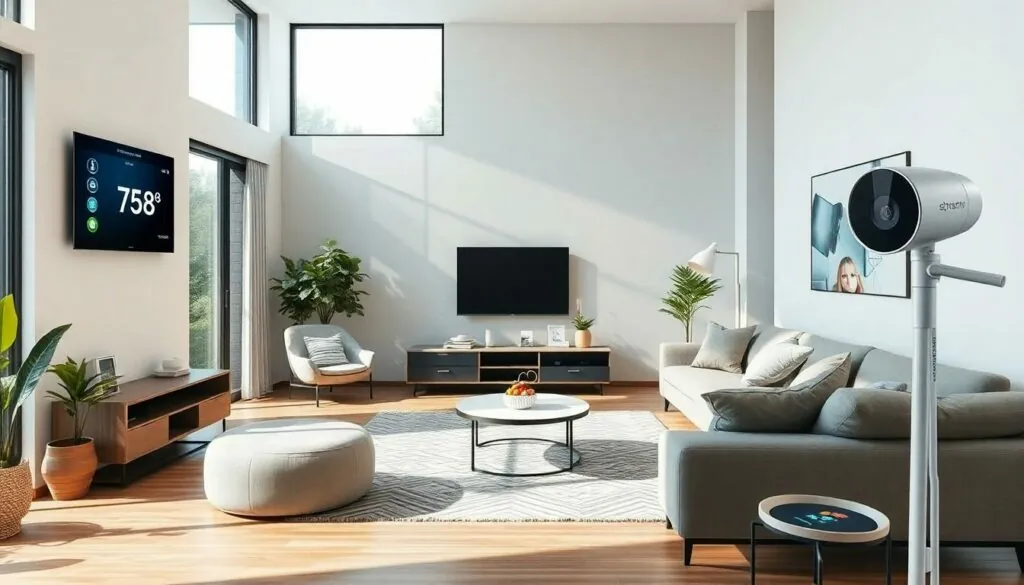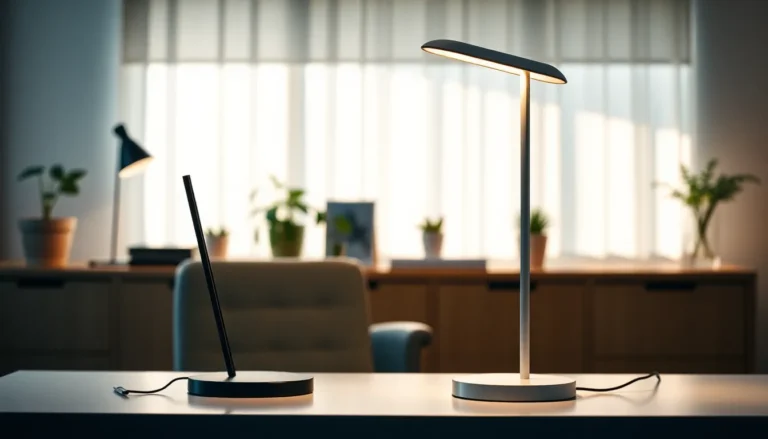Table of Contents
ToggleIn a world where your coffee maker can brew your morning cup before you even roll out of bed, the smart home business is booming like never before. Imagine a life where your home anticipates your every need—turning on lights, adjusting the thermostat, and even reminding you to take out the trash (because who doesn’t need a little nudge?). This isn’t science fiction; it’s the reality of smart technology, and it’s transforming homes into futuristic havens.
As more people embrace the convenience of smart devices, the opportunities for entrepreneurs in this space are endless. Whether you’re a tech whiz or just someone who loves gadgets, diving into the smart home business could be your ticket to success. So grab your virtual toolbox and get ready to explore how you can turn homes into intelligent living spaces while cashing in on this exciting trend.
Overview of Smart Home Business
Smart home business taps into the convergence of technology and consumer convenience. Automation simplifies everyday tasks, presenting significant appeal to homeowners. Devices like smart thermostats and security cameras foster increased efficiency and security. The market is projected to grow from $79 billion in 2022 to $135 billion by 2025, highlighting strong consumer interest.
Smart devices enhance lifestyle by offering real-time control through mobile applications. Common features include voice recognition and energy management, making homes more efficient and environmentally friendly. Entrepreneurs can seize opportunities by developing innovative solutions that cater to specific consumer needs. Smart lighting systems demonstrate this potential by balancing aesthetics with practicality, improving ambiance while reducing energy costs.
Rising smartphone penetration supports the smart home trend. More consumers are comfortable integrating technology into daily routines, prompting businesses to innovate. Product categories encompass home security, energy management, and entertainment systems. Each segment offers unique growth potential, encouraging startups and established firms to explore various niches.
Networking of smart devices forms the backbone of this industry. Integration among devices allows for seamless communication, enhancing the user experience. For instance, smart hubs connect different brands, ensuring compatibility and ease of use. Overall, smart home technology significantly impacts how people interact with their living spaces, addressing demands for convenience, safety, and energy efficiency.
Engaging with the smart home business involves understanding consumer behavior and technological advancements. Demands for personalized settings and convenience shape product development. Established trends like voice-activated assistants and smart appliances underscore the evolving landscape, suggesting that businesses tapping into these innovations can thrive in an increasingly competitive market.
Key Players in the Market

The smart home market features a variety of influential brands and innovative startups making significant contributions to the industry’s growth. Understanding these players helps clarify market dynamics.
Leading Brands
Prominent brands dominate the smart home landscape. Amazon, through its Alexa voice assistant and Echo devices, leads the market in smart speakers. Google follows closely with its Nest products, incorporating smart thermostats and security solutions. Apple has carved out a niche with HomeKit, offering seamless integration for iOS users. Samsung’s SmartThings platform enhances automation across a range of devices. Finally, companies like Ring and Philips Hue excel in home security and smart lighting systems, respectively, driving consumer interest and overall market expansion.
Emerging Startups
A wave of emerging startups is reshaping the smart home industry. Companies like Wyze focus on affordable smart cameras and home automation solutions. Ecobee innovates with smart thermostats designed to optimize energy consumption and comfort. Additionally, Sense aims to enhance energy monitoring to promote sustainability. Smart home security emerges with startups such as WINK, emphasizing user-friendly, interconnected systems. These newcomers demonstrate agility in product development and align with current consumer trends, enhancing competition and growth potential.
Trends and Innovations
The smart home industry continues to evolve rapidly, with trends highlighting enhancements in convenience and integration. Innovations shape everyday lifestyles, making homes more intuitive and responsive.
Internet of Things (IoT) Integration
IoT integration represents a cornerstone of smart home technology. Devices communicate seamlessly through interconnected networks, improving overall efficiency. Families enjoy enhanced convenience as smart appliances link with home assistants, creating a unified experience. Security systems benefit greatly from IoT, allowing users to monitor their homes remotely. The implementation of IoT solutions enables users to manage energy consumption effectively, supporting sustainability. Forecasts suggest consistent growth in IoT-enabled products, solidifying its place in households across the globe.
AI and Machine Learning Advancements
AI and machine learning advancements drive significant improvements in smart home offerings. These technologies analyze user behaviors, helping devices adapt to preferences over time. Systems equipped with AI can optimize energy usage, lowering household bills. Additionally, voice assistants powered by advanced machine learning provide personalized responses, enhancing user satisfaction. Smart learning thermostats adjust temperatures based on real-time data, promoting comfort and energy savings. As AI becomes more prevalent, companies in the smart home space can anticipate tailored solutions that meet evolving consumer demands.
Challenges in the Smart Home Business
The smart home business faces several challenges that entrepreneurs must navigate.
Security Concerns
Security concerns stand at the forefront of challenges in the smart home industry. Consumers worry about vulnerability to hacking and unauthorized access to sensitive data. Data breaches can lead to significant financial and reputational damage for companies. Additionally, many smart devices collect personal information, raising privacy issues that need attention. Companies that prioritize robust security measures and transparency can build trust. User education on best practices for security can also enhance consumer confidence. Regular updates and patches for software ensure systems remain secure against emerging threats. Addressing these security issues is essential for fostering broader adoption of smart home technology.
Market Competition
Market competition in the smart home sector intensifies as new players emerge. Established giants like Amazon and Google dominate, but startups like Wyze and Ecobee introduce innovative solutions. Pricing strategies also play a crucial role, as affordability becomes a differentiating factor. Many startups focus on sustainability and user-friendliness to attract consumers. Differentiating products with unique features, such as improved energy management, can provide an edge. Customer service quality often impacts brand loyalty in this fierce market environment. Continuous innovation and understanding consumer needs drive success in this rapidly evolving landscape.
Future of Smart Home Business
Projected to grow significantly, the smart home market is set to reach $135 billion by 2025, indicating strong demand for innovative solutions. Smart home technology continues to evolve, offering enhanced automation and user experiences. Enhanced energy management systems enable homeowners to monitor usage in real time, leading to lower bills and a reduced carbon footprint.
Increased integration of artificial intelligence is expected to allow devices to learn from user behaviors. This adaptability helps create smarter environments that intuitively respond to needs. Emerging technologies, such as machine learning algorithms, drive improvements in device functionalities and user interactions.
Rising concerns about security remain prevalent, necessitating robust measures to protect consumer data. Investing in end-to-end encryption and secure software updates builds trust and encourages adoption. Many companies now prioritize transparency in their data handling practices to address consumer apprehensions.
New startups are making significant strides by focusing on affordable and sustainable solutions. Brands like Wyze and Ecobee are reshaping the market landscape, proving that innovation doesn’t exclusively come from established players. Competitive pricing and excellent customer service emerge as key differentiators that foster brand loyalty among consumers.
Market competition will intensify as more players enter the smart home business. Identifying individual customer preferences aids companies in tailoring products and services. Creative marketing strategies will increasingly emphasize the convenience and automation potential inherent in smart home technology.
Overall, understanding consumer needs and technological advancements will be crucial for any business aiming to thrive in this burgeoning sector.
The smart home business stands at the forefront of technological innovation and consumer convenience. With significant market growth on the horizon and increasing consumer interest in automation, entrepreneurs have a unique opportunity to capitalize on this trend. By understanding the dynamics of consumer behavior and focusing on security and personalization, businesses can carve out a niche in this competitive landscape.
As smart devices continue to evolve, integrating AI and IoT capabilities, the potential for enhanced efficiency and user satisfaction grows. Companies that prioritize robust security measures will build trust and foster wider adoption of smart home technology. The future of the smart home industry looks promising, offering exciting avenues for those eager to participate in shaping modern living.




